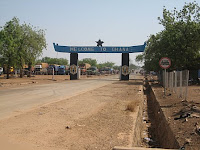 The last 2 or so weeks have been spent on a little escape from village life. The people of my village would be sickened to realize that I have spent about US $200.00 over the break, more than some of them make in a year. Someone on our trip made the bold statement “This is the best vacation that I have ever had” As I reflected on this, I came to the conclusion that it might have been for me as well. The drastic change from Burkinabè village to Ghana Beach Resort was about the fastest improvement in the quality of life that I have ever experienced. Now going back to Balla tomorrow is going to be a little difficult.
The last 2 or so weeks have been spent on a little escape from village life. The people of my village would be sickened to realize that I have spent about US $200.00 over the break, more than some of them make in a year. Someone on our trip made the bold statement “This is the best vacation that I have ever had” As I reflected on this, I came to the conclusion that it might have been for me as well. The drastic change from Burkinabè village to Ghana Beach Resort was about the fastest improvement in the quality of life that I have ever experienced. Now going back to Balla tomorrow is going to be a little difficult. Crossing the boarder into Ghana is a surprise. There are many things of a more developed country that jump out at you after being in Burkina for 7 months. They have paved roads, not only that they have lines on them; they have power lines to almost every village; they have more cars then bicycles; they have fresh English sweet bread not stale French bread; they have good food; a working economy; and most importantly they speak English. The list of differences could go on and on. I am not quite sure what all var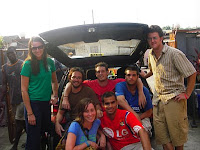 iables have made Burkina like the Mexico of Ghana. Ghana was an English colony, and being a coastal country with more natural resources surely made it a much more attractive colony to exploit, therefore development came hand in hand. The stark difference between these neighbors was the first time I realized how much government and development can change the quality of life for its inhabitants. This was multiplied by the fact that I was coming from the underdeveloped side of things and was able to taste the amenities of a more developed country. I definitely gained some weight down south, not only due to increased hygiene, but their food is actually good.
iables have made Burkina like the Mexico of Ghana. Ghana was an English colony, and being a coastal country with more natural resources surely made it a much more attractive colony to exploit, therefore development came hand in hand. The stark difference between these neighbors was the first time I realized how much government and development can change the quality of life for its inhabitants. This was multiplied by the fact that I was coming from the underdeveloped side of things and was able to taste the amenities of a more developed country. I definitely gained some weight down south, not only due to increased hygiene, but their food is actually good.
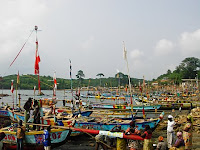 Ghana’s money is ridiculous. The cedi is the currency today in Ghana, but that might change to an international West African currentency soon. The largest bill is the equivalent to about US $2.00. So when I exchanged my CFA into Cede at the boarder I ended up with a stack of money about 3 inches thick. I have heard that when going to buy something expensive like a car, you need big sacks just to get the money to the dealership. Also it ends up taking 4 or 5 people all day just counting the money to verify the purchase. We had to wait about 5 minutes while the gas station attendant counted a stack of bills 3 times to fill up our tank. Everything is like that; the money just feels like monopoly money. I judged my trips’ financial plan by how tall my stack was. I never really ever counted how much money I had or was spending. But it all worked out fine and the equivalent vacation in the West would have been in the thousands.
Ghana’s money is ridiculous. The cedi is the currency today in Ghana, but that might change to an international West African currentency soon. The largest bill is the equivalent to about US $2.00. So when I exchanged my CFA into Cede at the boarder I ended up with a stack of money about 3 inches thick. I have heard that when going to buy something expensive like a car, you need big sacks just to get the money to the dealership. Also it ends up taking 4 or 5 people all day just counting the money to verify the purchase. We had to wait about 5 minutes while the gas station attendant counted a stack of bills 3 times to fill up our tank. Everything is like that; the money just feels like monopoly money. I judged my trips’ financial plan by how tall my stack was. I never really ever counted how much money I had or was spending. But it all worked out fine and the equivalent vacation in the West would have been in the thousands.
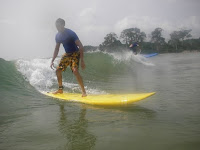 Most of our time was spent on the beach surfing. We met a couple who were old Peace Corps Volunteers in Bolivia in the 90’s and were just opening a surf shop on the coast. We rented long boards from them and spent about 5 days just surfing and relaxing. Then we did a few tourist things in the Area, we went to Kamkum National Forest and did some hiking in the one of the few remaining rainforests in West Africa. At the park they had constructed a canopy rope bridge system that linked the tallest trees together. It was about 200 feet off the ground and gave us a great chance to watch some monkeys playing around. The park was great but the realization that so little of these forests are left was really saddening. The logging of precious hardwoods done during the colonization of Ghana has left only a small fraction of the initial forests remaining. Also, desertification is ever encroaching south slowly changing more and more forests to dessert. It was good to see the forest being conserved and hopefully more can be saved.
Most of our time was spent on the beach surfing. We met a couple who were old Peace Corps Volunteers in Bolivia in the 90’s and were just opening a surf shop on the coast. We rented long boards from them and spent about 5 days just surfing and relaxing. Then we did a few tourist things in the Area, we went to Kamkum National Forest and did some hiking in the one of the few remaining rainforests in West Africa. At the park they had constructed a canopy rope bridge system that linked the tallest trees together. It was about 200 feet off the ground and gave us a great chance to watch some monkeys playing around. The park was great but the realization that so little of these forests are left was really saddening. The logging of precious hardwoods done during the colonization of Ghana has left only a small fraction of the initial forests remaining. Also, desertification is ever encroaching south slowly changing more and more forests to dessert. It was good to see the forest being conserved and hopefully more can be saved.
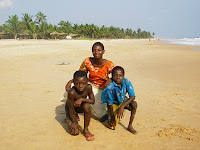
The next tourist attraction we visited was the Slave Trade Castle at Cape Coast. The first construction on the site was erected in 1653 for the Swedish and named Carolusborg after King Charles of Sweeden. In April 1663 the whole Swedish Gold Coast was seized by the Danes, and integrated in the Danish Gold Coast. In 1664 the Castle was conquered by the British and was extensively rebuilt in the late 18th century. In 1884, it became the seat of the colonial Government of the British Gold Coast.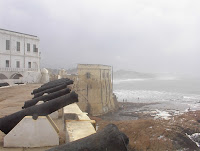
The Castle was built for the trade in timber and gold, later it was used in the trans-Atlantic Slave Trade. The Castle was first restored in the 1920's by the British Public Works Department. In 1957's when Ghana became independent, it passed under the care of the Ghana Museums and Monuments Board. In the early 1990's the building was restored by the Ghanaian Government, with funds from the UN Developpent Program, USAID, the Smithsonian Museum and other NGO's.
To the say the least it was a very solemn experience to see the dungeon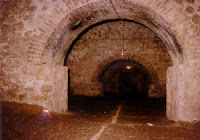 where hundreds of slaves were held awaiting the arrival of transport to the Americas. Walking through the “door of no return” where millions of slaves past in shackles to board the ships was an experience I will never forget. Our tour was full of African American tourists that had come to learn about their heritage and to search out their ancestral roots.
where hundreds of slaves were held awaiting the arrival of transport to the Americas. Walking through the “door of no return” where millions of slaves past in shackles to board the ships was an experience I will never forget. Our tour was full of African American tourists that had come to learn about their heritage and to search out their ancestral roots.
 The last 2 or so weeks have been spent on a little escape from village life. The people of my village would be sickened to realize that I have spent about US $200.00 over the break, more than some of them make in a year. Someone on our trip made the bold statement “This is the best vacation that I have ever had” As I reflected on this, I came to the conclusion that it might have been for me as well. The drastic change from Burkinabè village to Ghana Beach Resort was about the fastest improvement in the quality of life that I have ever experienced. Now going back to Balla tomorrow is going to be a little difficult.
The last 2 or so weeks have been spent on a little escape from village life. The people of my village would be sickened to realize that I have spent about US $200.00 over the break, more than some of them make in a year. Someone on our trip made the bold statement “This is the best vacation that I have ever had” As I reflected on this, I came to the conclusion that it might have been for me as well. The drastic change from Burkinabè village to Ghana Beach Resort was about the fastest improvement in the quality of life that I have ever experienced. Now going back to Balla tomorrow is going to be a little difficult.  iables have made Burkina like the Mexico of Ghana.
iables have made Burkina like the Mexico of Ghana. 
 Most of our time was spent on the beach surfing. We met a couple who were old Peace Corps Volunteers in
Most of our time was spent on the beach surfing. We met a couple who were old Peace Corps Volunteers in 
 where hundreds of slaves were held awaiting the arrival of transport to the
where hundreds of slaves were held awaiting the arrival of transport to the 